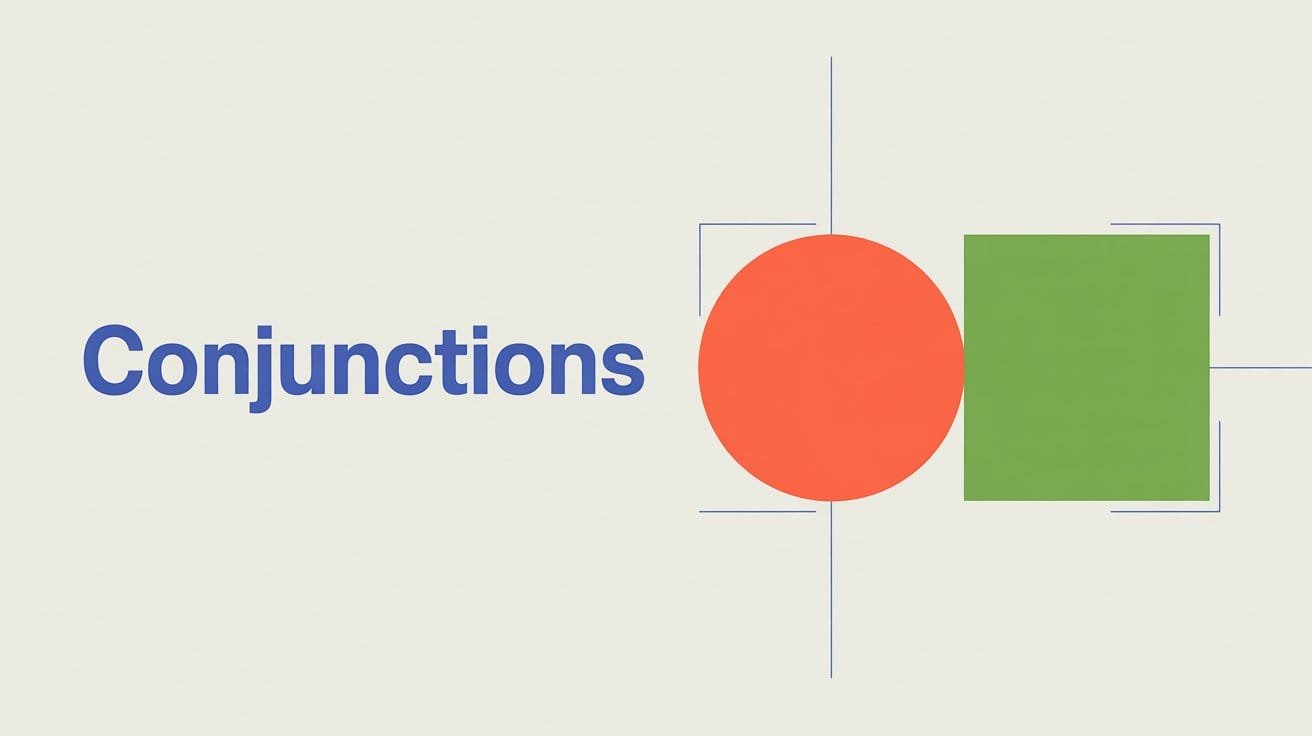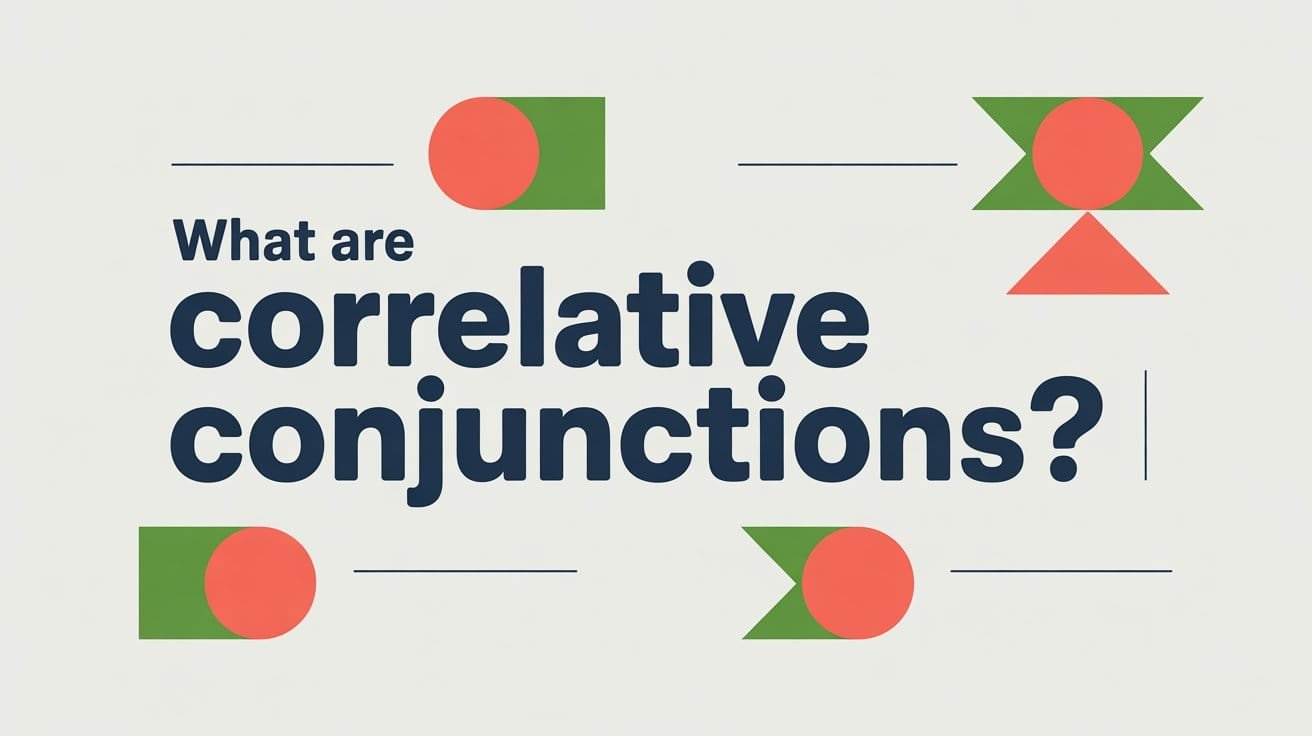Every sentence needs balance. Some ideas can stand on their own, while others rely on something else to feel complete. Subordinating conjunctions are the words that make this connection possible. They link an idea that cannot stand alone to an idea that completes its meaning.
These conjunctions explain how one idea relates to another, showing time, reason, condition, contrast, or purpose. For instance, “She practiced daily until she could play flawlessly.“
What Are Subordinating Conjunctions?
A subordinating conjunction is a word or phrase that links a dependent clause to an independent clause. It signals that one idea depends on another for its full meaning.
In a complex sentence, the subordinating conjunction introduces the dependent clause and explains the relationship between the two parts, such as cause, time, condition, contrast, or purpose.
Examples:
- We left early because the storm was getting worse.
- You can stay here if you keep the door locked.
- The baby fell asleep while her mother was reading.
Without the main clause, these dependent clauses (because the storm was getting worse, if you keep the door locked, while her mother was reading) would feel incomplete.
Subordinating conjunctions differ from coordinating conjunctions in that they do not join equal parts. Instead, they create hierarchy—one clause takes the lead, and the other supports it.
- Mia studied hard, so she passed the test. → Coordinating (equal parts)
- Mia passed the test because she studied hard. → Subordinating (one idea depends on the other)
By connecting unequal but related ideas, subordinating conjunctions turn simple sentences into more meaningful and connected thoughts.
Common Subordinating Conjunctions (by Function)
The table below lists the most common subordinating conjunctions and their primary functions.
| Function | Common Conjunctions |
|---|---|
| Cause / Reason | because, since, as |
| Time / Sequence | when, before, after, until, while, once, as soon as |
| Condition | if, unless, provided that, even if, in case |
| Contrast / Concession | although, though, even though, whereas, while |
| Purpose / Result | so that, in order that |
| Comparison | than, as … as |
| Place | where, wherever |
How Subordinating Conjunctions Work in Sentences
Subordinating conjunctions show how two ideas relate. They tell readers when, why, under what conditions, or to what extent something happens. The clause introduced by the subordinating conjunction depends on the main clause for its meaning. Together, they create a complex sentence that expresses a complete thought.
Let’s look at how different subordinating conjunctions function in context.
Showing Time
Time conjunctions help organize the sequence and timing between events. They link actions by indicating when something happens: when, before, after, until, while, once, as soon as
Examples:
- The players warmed up before the match started.
- We’ll leave as soon as the tickets are confirmed.
- He stayed at the office until the project was finished.
Showing Cause or Reason
These conjunctions clarify motivation or cause-and-effect relationships within a sentence. They explain why something happens: because, since, as
Examples:
- The presentation was postponed because the projector failed.
- She took a break since she had finished her part.
- We canceled the plan as the forecast predicted storms.
Showing Condition
Conditional conjunctions tell you that one idea depends on another: if, unless, provided that, even if
Examples:
- You can access the file if you have permission.
- We’ll go for a walk unless it starts raining.
- They’ll continue the project provided that funding remains available.
Showing Contrast or Concession
These conjunctions highlight differences or unexpected outcomes: although, though, even though, whereas, while
Examples:
- She looked calm although she was nervous inside.
- The plan was risky, yet it worked in the end.
- He enjoys hiking, whereas his friends prefer the beach.
Showing Purpose or Result
Purpose conjunctions make clear why an action happens. They express goal, intention, or outcome: so that, in order that
Examples:
- She left early so that she could prepare dinner.
- He paused in order that everyone could take notes.
Rules for Using Subordinating Conjunctions
Subordinating conjunctions follow a few simple but important rules. Knowing how to use them correctly helps you build smooth, balanced sentences without confusion or fragments.
Use a Comma When the Dependent Clause Comes First
When a sentence begins with a dependent clause, place a comma before the independent clause. The comma separates the introductory idea from the main one.
Incorrect: Although the lights were dim the room felt welcoming.
Correct: Although the lights were dim, the room felt welcoming.
Avoid Sentence Fragments
A dependent clause by itself cannot form a complete sentence. If you leave it without a main clause, the result is a fragment.
Incorrect: Since the report was incomplete.
Correct: Since the report was incomplete, we delayed the presentation.
Always make sure the subordinating conjunction is followed by a full idea to complete the meaning.
Choose the Right Conjunction for the Relationship
Different subordinating conjunctions express different logical relationships. Using the wrong one can change or confuse the meaning.
Incorrect: She left early although she wanted to catch the train. (No contrast here)
Correct: She left early because she wanted to catch the train.
Incorrect: I’ll go because it rains. (Cause doesn’t fit)
Correct: I’ll go if it rains. (Condition fits better)
Keep Clauses Close Together
The dependent clause should stay close to the main clause it modifies. If too much separates them, the sentence becomes unclear.
Incorrect: Although the weather was unpredictable yesterday, during our meeting at the library, the sky suddenly cleared.
Correct: Although the weather was unpredictable, the sky suddenly cleared during our meeting at the library.
Keeping related clauses close improves readability and flow.
Don’t Use More Than One Subordinating Conjunction for the Same Clause
Using multiple subordinating conjunctions can make the sentence illogical or redundant.
Incorrect: Although because she was tired, she went home early.
Correct: Because she was tired, she went home early.
Each dependent clause needs only one subordinating conjunction.
Combine Clauses Carefully for Clarity
When a sentence contains both coordinating and subordinating conjunctions, keep the structure clear.
Example: I stayed late because the project was due, and I wanted to review it once more.
Here, because introduces the dependent clause, while and connects two related actions.
Difference Between Subordinating and Coordinating Conjunctions
Both subordinating and coordinating conjunctions connect ideas, but they do so in different ways. The difference lies in how the connected ideas relate to each other—equal versus dependent.
Coordinating conjunctions connect parts of a sentence that have equal grammatical value. They often join two independent clauses or similar elements such as words or phrases. For example, “She enjoys reading, and he likes painting.” Here, both clauses can stand alone as complete sentences. The conjunction and simply balances them, creating a compound sentence.
Subordinating conjunctions, however, connect ideas that are not equal. One clause depends on the other to complete its meaning. For example, “She enjoys reading because it helps her relax.” In this case, the clause because it helps her relax cannot stand alone. It relies on the main idea to form a complete thought. This combination creates a complex sentence.
Another way to think about it:
- A coordinating conjunction joins two strong ideas of the same level.
- A subordinating conjunction joins a main idea with a supporting one.
Examples of Subordinating Conjunctions in Sentences
Below are examples that illustrate how these conjunctions express time, cause, condition, contrast, and purpose in everyday writing and speech.
- We waited inside until the rain stopped.
- The lights turned on when the power returned.
- She started cooking after everyone arrived.
- He stayed late because the task was urgent.
- The streets were empty since most people were watching the parade.
- She didn’t attend the seminar as she had another meeting scheduled.
- We’ll continue the match if the weather improves.
- You can’t log in unless your password is updated.
- The plan will succeed provided that everyone cooperates.
- He kept running although he was out of breath.
- The idea sounded risky, whereas the results were promising.
- She agreed to help, even though she was busy.
- He spoke clearly so that everyone could understand him.
- The lights were dimmed in order that the slides would be visible.
- The children played where the sand was softest.
- This route is shorter than the one we took last time.
FAQs About Subordinating Conjunctions
What is a subordinating conjunction?
A subordinating conjunction is a word that connects a dependent clause to an independent clause, showing how the two ideas relate. Example: I’ll call you when I reach home.
How many subordinating conjunctions are there in English?
There’s no fixed number, but English uses dozens of subordinating conjunctions, including common ones like because, when, although, if, and since. Some are single words, while others are phrases such as as soon as or in order that.
Can a sentence start with a subordinating conjunction?
Yes. Starting with a subordinating conjunction is grammatically correct. Just remember to add a comma after the dependent clause. Example: Although the task was difficult, everyone contributed.
Is “because” always a subordinating conjunction?
Yes. Because always introduces a reason or cause, making the clause it begins dependent on the main idea. Example: He stayed home because he felt unwell.
What are some examples of subordinating conjunction phrases?
Common multi-word conjunctions include as long as, so that, in case, even if, and in order that.
Example: Keep your phone charged in case there’s an emergency.
Can a sentence have more than one subordinating conjunction?
Yes, but only if it’s clear and grammatically balanced.
Example: We’ll travel tomorrow if the roads reopen after the storm clears.



